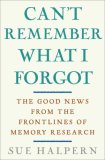
The Good News from the Front Lines of Memory Research
by Sue Halpern
An essential behind-the-scenes foray into the world of cutting-edge memory research that unveils findings about memory loss only now available to general readers.
When Sue Halpern decided to emulate the first modern scientist of memory, Hermann Ebbinghaus, who experimented on himself, she had no idea that after a day of radioactive testing, her brain would become so "hot" that leaving through the front door of the lab would trigger the alarm. This was not the first time while researching Can't Remember What I Forgot, part of which appeared in The New Yorker, that Halpern had her head examined, nor would it be the last.
Halpern spent years in the company of the neuroscientists, pharmacologists, psychologists, nutritionists, and inventors who are hunting for the genes and molecules, the drugs and foods, the machines, the prosthetics, the behaviors and therapies that will stave off Alzheimer's and other forms of dementia and keep our minds–and memories–intact. Like many of us who have had a relative or friend succumb to memory loss, who are getting older, who are hearing statistics about our own chances of falling victim to dementia, who worry that each lapse of memory portends disease, Halpern wanted to find out what the experts really knew, what the bench scientists were working on, how close science is to a cure, to treatment, to accurate early diagnosis, and, of course, whether the crossword puzzles, sudokus, and ballroom dancing we’ve been told to take up can really keep us lucid or if they’re just something to do before the inevitable overtakes us.
Beautifully written, sharply observed, and deeply informed, Can't Remember What I Forgot is a book full of vital information–and a solid dose of hope.
"So much of who we know ourselves to be comes from what we remember,' Halpern writes, and her timely book offers a vivid, often amusing introduction to a science that touches us all." - Publishers Weekly.
"High-quality science writing: an illuminating picture of investigators at work and a lucid explication of their findings." - Kirkus Reviews.
"Starred Review. Educational, fabulously well written, and on a hot topic. Highly recommended for both public and academic libraries." - Library Journal.
This information about Can't Remember What I Forgot was first featured
in "The BookBrowse Review" - BookBrowse's membership magazine, and in our weekly "Publishing This Week" newsletter. Publication information is for the USA, and (unless stated otherwise) represents the first print edition. The reviews are necessarily limited to those that were available to us ahead of publication. If you are the publisher or author and feel that they do not properly reflect the range of media opinion now available, send us a message with the mainstream reviews that you would like to see added.
Any "Author Information" displayed below reflects the author's biography at the time this particular book was published.
Your guide toexceptional books
BookBrowse seeks out and recommends the best in contemporary fiction and nonfiction—books that not only engage and entertain but also deepen our understanding of ourselves and the world around us.